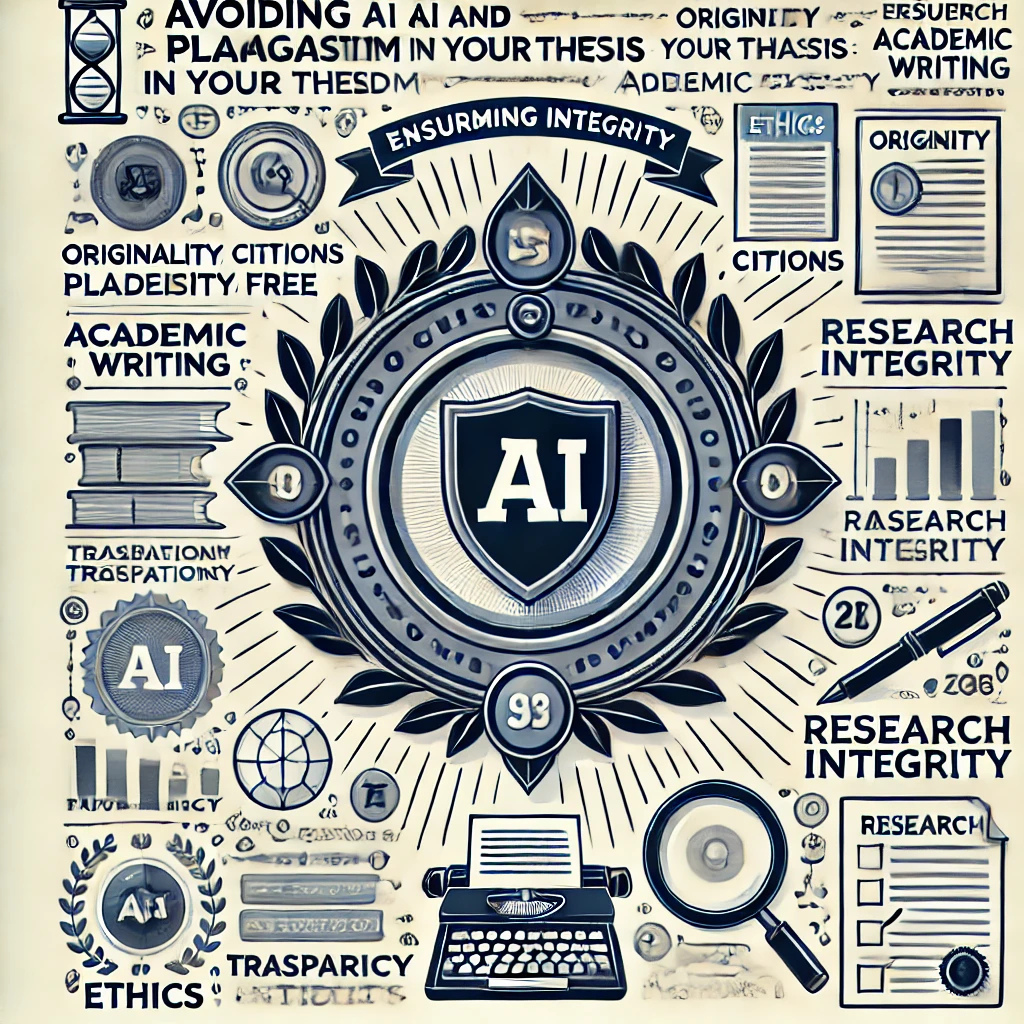Avoiding AI and Plagiarism in Your Thesis: Ensuring Academic Integrity
Writing a thesis is a significant academic endeavor, and maintaining integrity is crucial throughout the process. For PhD scholars, the use of AI tools and the prevention of plagiarism are two key areas that demand careful attention. Balancing the benefits of AI with the necessity of original, ethical work is essential for producing a high-quality, credible thesis. This guide explores how to effectively navigate these challenges, offering practical strategies for ensuring that your research is both innovative and authentic.
Responsible Use of AI in Research
In the context of academic research, AI tools can offer substantial support, aiding in various tasks such as generating ideas, organizing data, and even drafting sections of text. However, reliance on these tools can pose risks if not managed carefully. One common issue is the unintentional incorporation of AI-generated content without adequate modification or understanding. To prevent this, it is important to use AI as a supplementary resource rather than a primary content generator. While AI can assist in structuring your thoughts or suggesting improvements, the core of your thesis should reflect your own critical thinking and research. Engage deeply with your data and findings, ensuring that the insights and arguments presented are derived from your own analysis.
Transparency in AI Utilization
Moreover, when using AI tools, transparency is key. Clearly indicate in your methodology section how these tools have been utilized in your research process. This disclosure not only upholds academic integrity but also allows readers to understand the role of AI in your work. It is essential to validate any AI-generated content against reliable sources and ensure its accuracy and relevance. By doing so, you maintain the credibility of your research and avoid the pitfalls of unverified or misleading information.

Avoiding Plagiarism: Proper Citation Practices
Plagiarism, whether intentional or unintentional, is a serious concern in academic writing. It involves using someone else’s ideas, words, or research without proper attribution. To avoid plagiarism, a thorough understanding of proper citation practices is essential. Familiarize yourself with the citation style required by your institution, such as APA, MLA, or Chicago. This knowledge will guide you in accurately citing sources and ensuring that all references are properly attributed.
Safeguarding Against Unintentional Plagiarism
When incorporating external sources into your thesis, whether through direct quotes or paraphrasing, always provide clear citations. Direct quotes should be enclosed in quotation marks and followed by appropriate references. Paraphrased ideas must be rephrased in your own words and accompanied by citations. This practice not only acknowledges the contributions of other researchers but also strengthens the scholarly rigor of your work.
Using Plagiarism Detection Tools
To further safeguard against unintentional plagiarism, use plagiarism detection tools to review your thesis. These tools can identify similarities between your text and existing literature, helping to ensure that your work is original. While these tools are valuable, they are not infallible. Combine their use with meticulous manual checking and thorough citation practices. Remember that these tools can only detect similarities within their databases; they cannot replace the need for careful, ethical writing.
Maintaining Accurate Research Notes
Maintaining accurate and detailed research notes is another effective strategy for avoiding plagiarism. Record all sources of information and how they were used in your research. This practice not only aids in proper citation but also helps you track the development of your ideas and arguments. By keeping comprehensive records, you ensure that all sources are appropriately acknowledged and can easily trace the origins of your information.
Avoiding Self-Plagiarism
Another common issue is the risk of self-plagiarism, which involves reusing your previously published work without proper acknowledgment. While it is acceptable to build upon your prior research, it is crucial to differentiate between new and reused content. Clearly cite your own earlier publications when referencing them and ensure that any reused material is contextually relevant and properly attributed. This approach maintains the originality of your thesis and respects the boundaries of academic integrity.

Developing Strong Research Habits
Developing strong research habits is essential for avoiding plagiarism and ensuring the originality of your work. Engage deeply with your topic, synthesize information from multiple sources, and present your findings and insights in your own words. Avoid the temptation to rely heavily on existing literature or AI-generated content. Instead, use these resources as tools to support and enhance your own critical analysis and contributions.
Adhering to Institutional Guidelines
Lastly, adhere to institutional guidelines and ethical standards for thesis writing. Each institution may have specific policies regarding the use of AI and citation practices. Familiarize yourself with these guidelines and ensure that your work complies with them. Adhering to institutional requirements not only ensures academic integrity but also demonstrates your commitment to scholarly excellence.